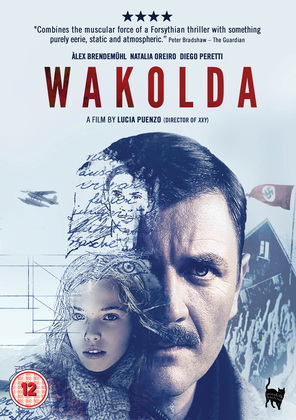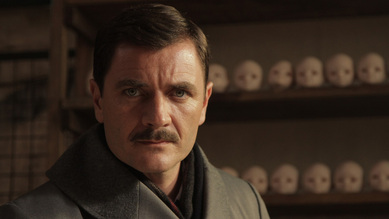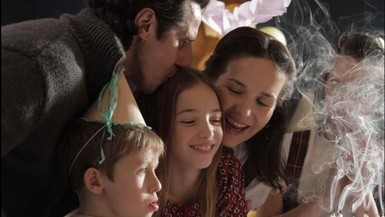
by Hayley Charlesworth
When one thinks about the most sadistic horrors inflicted during the Holocaust, the people that come to mind are the usual suspects: Hitler, Himmler, Goebbels and the like. One slightly less well-known but perhaps the most depraved of all was Dr Josef Mengele, the geneticist who inflicted unspeakable experiments on prisoners of war.
But Wakolda, the Argentinian film released through Peccadillo Pictures, does not concern itself with this grizzly history, instead telling in an eerie, detached fashion the story of Mengele’s time in Argentina.
When one thinks about the most sadistic horrors inflicted during the Holocaust, the people that come to mind are the usual suspects: Hitler, Himmler, Goebbels and the like. One slightly less well-known but perhaps the most depraved of all was Dr Josef Mengele, the geneticist who inflicted unspeakable experiments on prisoners of war.
But Wakolda, the Argentinian film released through Peccadillo Pictures, does not concern itself with this grizzly history, instead telling in an eerie, detached fashion the story of Mengele’s time in Argentina.

Adapted by Lucia Puenzo from her own novel, Alex Brendemühl plays Mengele as a mysterious stranger befriending and setting up home with an Argentinian family. While ostensibly claiming to be a vet, the doctor takes a disturbing interest in the family’s 12 year old daughter, played by Florencia Bado. Mengele’s obsession with bodily perfection is certainly not behind him.
Wakolda plays half as a psychological thriller, and half as an arthouse project. The Argentinian mountain landscape provides a beautiful, serene backdrop to a quietly creeping sense of dread. Rather than sensationalise Mengele, Puenzo’s film has a detached atmosphere to it, the same sort of detachment one assumes Mengele felt himself. The dichotomy between the breathtaking cinematography and Mengele’s own barbaric deeds turns this story into a queasy thriller; one that it at once uncomfortable and captivating to watch. In turn, the story unfolds methodically and slowly, steering away from thrills towards a feeling of almost paranoia whilst watching. Occasionally this works against the film, as the dramatic impact of the story is sometimes lessened by that lack of connection, but this is a very rare occurrence.
Wakolda plays half as a psychological thriller, and half as an arthouse project. The Argentinian mountain landscape provides a beautiful, serene backdrop to a quietly creeping sense of dread. Rather than sensationalise Mengele, Puenzo’s film has a detached atmosphere to it, the same sort of detachment one assumes Mengele felt himself. The dichotomy between the breathtaking cinematography and Mengele’s own barbaric deeds turns this story into a queasy thriller; one that it at once uncomfortable and captivating to watch. In turn, the story unfolds methodically and slowly, steering away from thrills towards a feeling of almost paranoia whilst watching. Occasionally this works against the film, as the dramatic impact of the story is sometimes lessened by that lack of connection, but this is a very rare occurrence.

As Mengele, Alex Brendemühl avoids the usual trappings of Nazi portrayal in cinema. This man is not outwardly evil, and is in fact very charismatic. The film even goes so far to suggest that Mengele has a conscience; that his barbaric experiments were for the betterment of society as Mengele viewed it. This suggestion is backed up by the storyline of the daughter, Lilith. Born prematurely, Lilith is teased for her small size, and it is for this reason that her parents entrust her to Mengele. Of course, history has taught us otherwise, but Wakolda makes it easy for the viewer to believe that Lilith’s parents assumed Mengele only had a desire to help her daughter. Wakolda ultimately proves that sometimes, the worst monsters are the ones we are allowed to see as human.
One of the biggest criticisms of Wakolda is the film’s short running time. At only 93 minutes, Wakolda is therefore limited in scope to experiment and develop its ambition into something all the more involving and disturbing. Despite the story itself already showing a great deal of ambition, the film’s many strengths still do not disguise the fact that it had potential to do more. Nevertheless, Wakolda largely succeeds, thanks to its unrivalled cinematography, an uncomfortably stoic performance from its lead actor, and in telling a story that is a world away from the Nazi-themed media we tend to encounter.
One of the biggest criticisms of Wakolda is the film’s short running time. At only 93 minutes, Wakolda is therefore limited in scope to experiment and develop its ambition into something all the more involving and disturbing. Despite the story itself already showing a great deal of ambition, the film’s many strengths still do not disguise the fact that it had potential to do more. Nevertheless, Wakolda largely succeeds, thanks to its unrivalled cinematography, an uncomfortably stoic performance from its lead actor, and in telling a story that is a world away from the Nazi-themed media we tend to encounter.
What Do You Think?

Is Wakolda a Hit Play?
Or did you think Hit Stop?
The film is out on DVD now!

 RSS Feed
RSS Feed
